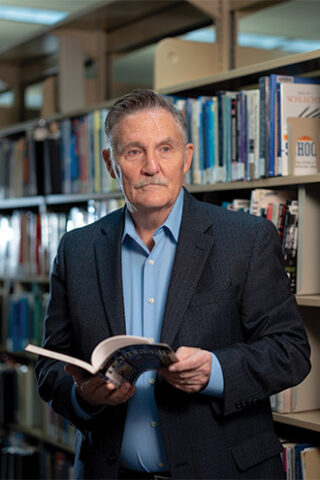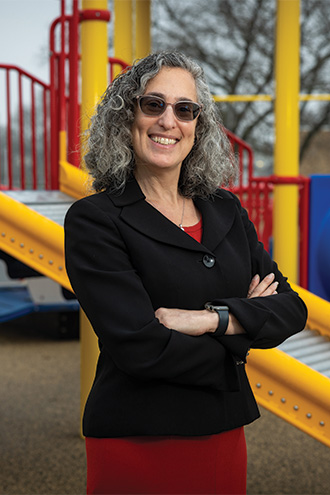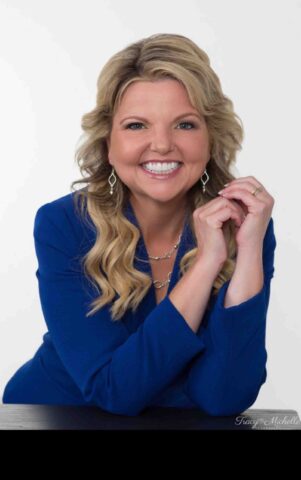And the 2022 Distinguished Alumni Award Goes To…

The Distinguished Alumni Award is given to alumni who lead with compassion and positively impact their fields. It reflects the excellence of the University and those who have created a legacy others may strive to achieve.
The Distinguished Alumni Award is the highest honor conferred by the Wilmington University Alumni Association. For the first time, three alumni were chosen for the honor.
Here are their stories.
Dr. Hugh Broomall
Dr. Hugh Broomall’s parents met in classic World War II style. His father, a Wilming-ton native, served in the Navy and was assigned to the cruiser USS Canberra, which sailed out of Boston to fight in the Pacific. At the same time, his mother was doing a “Rosie the Riveter” job in Boston’s Charleston Navy Yard. They “met cute” there, got married after the war, and returned to live in Delaware.
With that kind of romantic legacy, it’s little wonder that Dr. Broomall and his older siblings also entered the military; his brother joined the Navy and his stepbrother enlisted in the Army (and served in Korea). Naturally, young Hugh followed them, enlisting in the Delaware Air National Guard (DE ANG) in 1967, the year after he graduated from Salesianum School.
That decision set him on a 45-year career trajectory that culminated in the rank of major general. Along the way, he collected a staggering array of honors, including the USAF Distinguished Service Medal, the Legion of Merit, a Meritorious Service Medal, and a Global War on Terrorism Service Medal.

Dr. Broomall’s connection to Wilmington University has lasted nearly as long, beginning in 1983 when he was an undergraduate and continuing today as adjunct professor at an institution he credits for much of his extraordinary career.
Soon after that career began, the newly minted airman 1st class was deployed to help quell the 1968 civil disturbance in Wilmington, which was sparked by the assassination of Dr. Martin Luther King Jr. It was a sobering reminder of the National Guard’s vital role, in both peacetime and in war.
Looking back on those pivotal days, Dr. Broomall says: “It was surreal to see your hometown burning. But we were treated well and most of the public I encountered were glad we were there.”
He soon entered Officer Candidate School and was commissioned as a 2nd lieutenant in the DE ANG in 1974. A year later, he became the first 2nd lieutenant in the nation to lead a state National Guard Association. America’s new all-volunteer force required a focus on recruiting and retention of Guardsmen, and with that in mind, in 1980 Dr. Broomall spearheaded an effort that resulted in the Delaware General Assembly enacting the first state education tuition program for Army and Air Guardsmen.
Even as he led the DE ANG, he was gaining a reputation as a military intelligence officer. From 1974 to 1990, he supported USAF and Air National Guard missions worldwide, including operations in Europe, Central and South America, and the Middle East. In 1985, as a major, he was the first Air Guard member to be named U.S. Military Airlift Command Intelligence Officer of the Year.
His other career highlights are too numerous to detail here, but he lists among the most significant his successful effort in 2005 to save the Delaware Air National Guard Base at the New Castle County Airport. The Department of Defense, led by Donald Rumsfeld, wanted to close about 180 military installations, including the Delaware base. As a brigadier general and assistant adjutant general, Dr. Broomall assembled a team of experts from the Guard, local government, and the Delaware Congressional delegation that identified errors in the government’s process and repelled the DOD recommendation.
My career in the Air Force would not have gone as it did without Wilmington University.”
—Dr. Hugh Broomall
He retired as a major general in 2012. At his retirement ceremony, his boss, Air National Guard Director Lt. Gen. Harry Wyatt III, called him “an outstanding asset to the nation. During critical budget times, his tireless work with the military, private industry, and the Hill directly contributed to keeping the Air National Guard ready, relevant, and reliable to serve our state and federal military requirements well into the future. He is an outstanding American.”
At Dr. Broomall’s side during the ceremony at the New Castle Airport was his wife, Christy. Married for 55 years, the Broomalls have three children and four grandchildren. He credits her with doing most of the parenting: “She was here raising three kids while I was out seeing the
world.”Following his retirement, Dr. Broomall became an adjunct professor at WilmU, teaching graduate courses in Global Leadership, Human Resources, and Marketing. He also often sits on doctoral dissertation committees for students who are in the military.
This marks a return to the school where he earned a master’s in Public Administration and Human Resources in 1996, thanks to WilmU’s remote learning offerings. And while serving as an adjunct, he found time to earn a doctorate in Business Administration in 2016.
“I’m a big fan of Wilmington University,” Dr. Broomall says. “It’s one institution that has stayed aligned to its original mission statement, with a focus on the adult learner.
“And I love the whole experience of teaching. It’s a way for me to pay back Wilmington U for all it’s done for me. My career in the Air Force would not have gone as it did without Wilmington University.”
Dr. Rachael Rudinoff
Rachael Rudinoff was a math whiz at Horace Greeley High School in Chappaqua, New York. So, not surprisingly —and encouraged by her father — she planned to major in Accounting in college. But in her first year after graduation, she was committed to a year in Israel as part of a work/study program sponsored by Hadassah. And that changed her plans and her life.
In Israel she initially lived on a kibbutz (a communal settlement, typically a farm). After one day of working in the fields, she asked for a transfer and was assigned to “the baby house.”
That’s when, she says, “I suddenly realized that I had a passion for working with children.”
Next, she was assigned to teaching English to Ethiopian refugees fleeing persecution in their homeland. “And that was when I absolutely knew I wanted to be a teacher,” she says. “I was not going to be an accountant.”

Accounting’s loss was special education’s gain. She went on to become Dr. Rachael Rudinoff, receiving her Ed.D. in Innovation and Leadership from Wilmington University in 2011. She has served as director of Special Services for the Smyrna (Delaware) School District since 2015, and she has been an adjunct professor at WilmU since 2006, teaching graduate-level special education teacher candidates in the School of Education.
Her academic journey shows a single-mindedness that, from the start, honed the skills she would need for her new-found calling.
In 1990, she earned a B.A. in Psychology with a Business minor from the University of Albany, SUNY. Graduating summa cum laude, she was inducted into Phi Beta Kappa. The next year, she received an M.S. in Early Childhood and Elementary Education at Bank Street College of Education in New York City. Her second master’s — in School Psychology — came in 2001 from the University of Delaware, where she was inducted into Phi Kappa Phi Honor Society.
After receiving her first master’s, Dr. Rudinoff attended a National Teachers Conference job fair and was recruited by Sanford School to teach third grade. The Long Island native fell in love with the Hockessin school and stayed there for nine years.
But she eventually realized her calling was special education, and after receiving her master’s in School Psychology she interned as a school psychologist in the Christina School District. Then she moved to the Smyrna School District, where she has served for 21 years. She was a school psychologist for the district from 2001 to ’09, then spent two years as a Special Education instructional specialist before being named Special Services director.
During her time in Smyrna, Dr. Rudinoff has seen the district double in size. “When I came here,” she says, “there were fewer than 3,000 students in the district; now there are over 6,000.”
Under her leadership, the district has been able to expand its capacity to educate students with increasingly diverse needs.
I cherish the opportunity to help prepare our future educators. Wilmington University helped to prepare me for my leadership roles and I’m happy that I can use that knowledge to help others.”
—Dr. Rachael Rudinoff
“Given that we were a small district, we used to send our students with more significant disabilities, such as those with autism, intellectual disabilities and physical impairments, to consortium schools in Kent County,” she says. “I’ve made it my mission to build my team and the level of expertise in our district so that we can provide programming for students with complex needs, allowing these students to remain part of their home district.”
She has indeed built her team, which numbered little more than a dozen when she became Special Services director. Eleven years later, she leads a staff of 60.
As the Department of Education’s liaison to the district, Linda Smith has seen that staff in action. In a letter supporting Dr. Rudinoff as a Distinguished Alumna, Smith writes: “In meeting the needs of the most complex youth, Dr. Rudinoff and her staff make home visits, arrange social service supports, and supplement basic needs resources. For those youth who require unique education alternatives, Rachael travels to private programs in neighboring states to support and maintain relationships with these students and provide direct oversight to the private program staff.”
Calling Dr. Rudinoff “a role model,” Smith says, “She truly cares about others.”
The passion Dr. Rudinoff brings to her job is duplicated in the WilmU classes she teaches. In fact, she designed some of the courses.
“I cherish the opportunity to help prepare our future educators,” she says. “Wilmington University helped to prepare me for my leadership roles and I’m happy that I can use that knowledge to help others.”
She and her husband, Mark, whom she met at Sanford, live in Earleville, Maryland. Away from work, she says, “I’m very focused on family.”
And that family is growing. The Rudinoffs have two sons and two stepdaughters, and recently welcomed their fourth grandchild and first granddaughter.
Dr. Michelle Shaivitz
“Broken Is A Gift” is more than just the title of Dr. Michelle Shaivitz’s book; it’s pretty much her guiding philosophy — a philosophy that saved her life.
Dr. Shaivitz, who earned an Ed.D. from Wilmington University in 2015, has been an educator for more than 20 years, teaching at every level from pre-school to college, and moving on to executive positions in the nonprofit field. She is currently vice president of Student Success with United Way of Delaware, overseeing United Way’s educational initiatives in the First State.
She focuses primarily on literacy through a continuum of services from birth all the way to career and college readiness and success. “We are trying to meet each person at the level of their needs,” she says. “We work on supporting the whole child, not just in the classroom, but in the family, the educators that work with them, the community that surrounds that child.”
She is especially invested in improving early learning. “The key to success for future generations is educating our youngest learners,” she says. “It’s the biggest return on investment you can get in this country today — bar none.”

She discovered the importance of early learning through personal experience. She and her husband, Mitchell, who live in Abingdon, Maryland, spent more than a decade as foster parents to what she calls “some of the neediest children you can imagine.”
Fifteen years ago, they adopted sisters Isabella and Alena from foster care. At the time, Isabella was 12 and Alena was 1½, and both were in poor health.
Today, Alena is a senior at the Teacher Academy of Maryland and Isabella is married, a specialist 4th class in the Army, and the mother of a three-year-old daughter.
As proud as she is to be a mother and grandmother, Dr. Shaivitz is equally proud of another title: recovering alcoholic.
She has been sober and an active member of Alcoholics Anonymous for more than a decade, but drinking, she says, “sucker-punched me,” and nearly ruined what on the surface seemed to be the perfect life: a happy marriage, two beautiful daughters, a nice house, a successful career, and many friends. But like the proverbial duck, just below the surface she was paddling frantically to stay afloat.
Alcohol posed no problem for her until about 15 years ago, after a vacation in Jamaica. “I started chasing that vacation brain,” she says, “where you’re relaxed and you don’t have responsibilities, and you’re not worried about kids and work and everything else.”
Over the next 18 months, the progressive disease transformed her from an occasional social drinker to a full-blown alcoholic. “It became something I needed,” Dr. Shaivitz says. “I wanted to drink more than I wanted to be a mother, more than I wanted to be a wife, more than I wanted to breathe.”
She got help, went to AA meetings, got a sponsor, and stayed sober for two years. Then, one summer night in 2012, driving home from classes at WilmU, she hit bottom. A detour off I-95 took her past a liquor store. Inexplicably, she pulled in, bought several mixed mini-drinks, and downed them in the parking lot. On the way home, she was arrested for driving under the influence. Already on probation for DUI, she was sentenced to 33 days in the Harford County Detention Center.
While the experience was “awful,” she says it saved her life.
The key to success for future generations is educating our youngest learners. It’s the biggest return on investment you can get in this country today — bar none.”
— Dr. Michelle Shaivitz
The lifesaver was a woman who came to the jail to conduct an AA meeting, and her message resonated so profoundly with Dr. Shaivitz that she asked the woman for a hug — despite a strict “no touching” rule.
After that tearful embrace, Dr. Shaivitz says, “I went back to my cell and hit my knees and asked for help, and I haven’t had the desire to drink since.”
She went on to earn her Ed.D. in Organizational Leadership, Learning and Innovation, doing her dissertation on recidivism, then served as adjunct professor at WilmU for four years, teaching SEC 6010 Planning for Information Security in the master’s level.
Meanwhile, she had been telling her story at AA meetings and elsewhere and realized that “the more I told it the more I saw it really helped people, because there are so many suffering in silence.”
So she began writing. Three years later, “Broken Is A Gift” was published — on June 24, 2020 — her eight-year sober anniversary. It’s available through Barnes & Noble, Walmart, and Amazon and has been translated into several languages.
The book’s title comes from Dr. Shaivitz’s belief that being broken is a gift because it means you can rebuild yourself however you want. It addresses addiction and other problems, and the process of overcoming those challenges. Mostly, though, says the author, “It’s about getting yourself unstuck and truly living your own life instead of just poking along and existing.”
“Humbled and grateful” to be chosen one of WilmU’s Distinguished Alumni, Dr. Shaivitz has followed her own blueprint and rebuilt her life. Today, as she says in her bio, she is “a wife, mother of two amazing daughters, ‘Grammy’ to her first grandchild, lover of all animals, good food, great coffee, and all things uplifting.”



